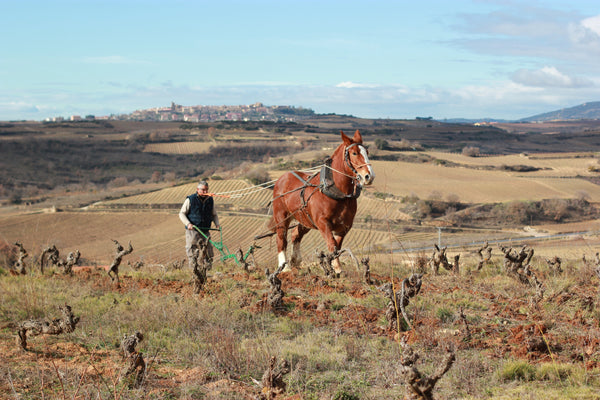
Artadi
Located in Laguardia in the Rioja Álava region, the Artadi estate was founded by 12 local winegrowers back in 1985. Their dream was to make a wine that would bring out the true character of the region. These Vino Tradicional de Cosechero wines were made from whole bunches of grapes, respecting the time needed to ferment in large open vats. Five years later, they began to select grapes from the best vineyards, which gave rise to Vinos de Pueblo wines. In 1992, the farm became the property of the Lacalle and Laorde families. Ten years later, the vineyards began to be cultivated using organic methods, and at the same time, the families began to look for even more unique vineyard areas, which eventually led to Vinos de Parcela wines. These wines from single vineyard area are each made as a creation of their own biotope and ecosystem.
Today, Artadi's organically certified wines are still divided into village and single vineyard wines. Artadi's vineyards are located in the villages of Laguardia, Elvillar de Álava and Lanciego. In total, there are 74,15 hectares of vines on different soils under the protection of the Sierra de Toloño and Sonsierra Alavesa mountains. The soil, filled with limestone, gravel and clay, is poor, so the vines have to sink their roots deep into the soil. The conditions are influenced by continental, Mediterranean and Atlantic climates. The crown jewel of Artadi's single vineyard wines has been produced since 1991 in Viña El Pisón. The wine comes from a 2,4-hectare vineyard planted in 1945. Valdeginés comes from a 4,1-hectare east-facing vineyard in Laguardia, La Poza de Ballesteros from a 1,18-hectare west-facing vineyard in Elvillar de Álava, and El Carretil from an east-facing 3,64-hectare vineyard. In 2016, the estate released two more new single vineyard wines: Quintanilla Elvillar, made from a 1,13-hectare east-facing vineyard, and San Lázaro Laguardia, made from a 1,62-hectare west-facing vineyard.
Artadi's winemaker, Juan Carlos López de Lacallen, has succeeded in raising Artadi, which started as a cooperative, to world fame as the number one producer in the Rioja region. Among others, Tim Atkin MW lists Artadi as one of Rioja's First Growth producers in his own classification. Lacalle, who comes from a family of winegrowers from Laguardia, was one of the first oenologists to graduate in Madrid. After traveling to the wine-growing regions of the world, Lacalle returned to his home region. Lacalle was surprised by how many local producers focused only on the work done in the cellars, instead of paying attention to the annually changing conditions in the vineyards. The producers seemed to be more interested in the colour and purity of the wines than the length of the taste or the mouthfeel. Today, Juan Carlos' son Carlos shares the work in the cellar with his father, cherishing the original idea of the founders of Artadi to bring out the characteristics of the region in the wines. The family's daughters Patricia and Maria, as well as the family's mother, are also closely involved in the operation of the farm.
In the López de Lacalle family's vineyards work follows traditional farming methods without fertilizers and synthetic chemicals. The soil of the rows of vines is worked with the help of horses, so that the soil is not compressed due to excessively heavy machines. Modern techniques are used in the wine cellar, which means that the wines are fruity and respectful of their terroir, and not oxidized. The wines are matured in French oak barrels, and no American oak is used at all.
Artadi was one of the first producers in the region to stop using the traditional Spanish quality classification focused on the aging of the wines on their labels, so the labels never mention Crianza, Reserva or Gran Reserva. For Artadi, the origin of the grapes and vine age are more important than how long the wines have been aged in barrels. In December 2015, Artadi decided to reject the Rioja appellation, sparking an ongoing debate about the need for changes in Spanish wine legislation.
Inspired by Rioja's passionate project, the producer now has other projects too: Artazu in Navarra (1996), El Sequé in Alicante (1999) and Guipúzcoa in Izar-Leku (2015).
https://artadi.com/en





